Here’s one thing to admit: recently we often feel scared.
In 2018, when the two of us wrote stories such as RYB kindergarten’s child abuse case and the national Spring Festival gala’s racial discrimination, our biggest fear was to get a knock on the door by the authority and being invited for “tea”. While such fear remains, what worries us even more today is our words on Elephant Room would become evidence for our crimes, not judged by the government, but by the people on the Chinese internet.
With fear comes a crushing sense of powerlessness, particularly during this weird time as a tragic pandemic threatens every human’s life. This is a time when we are supposed to be most united as a species, yet what we see is sweeping nationalism and discrimination that are dividing us more profoundly. In China, the misery of COVID-19 along with an increasing hatred toward the U.S has together cultivated a wave of spontaneous (fueled by media demagoguery and censorship of course) patriotism that seems to be the fiercest over the past two decades. Today, to destroy a person’s reputation no longer requires the door-knock from the authority; as long as there is the internet (which records everything) and the patriotic Red Guards (which is everywhere on today’s Chinese internet), everyone could be trailed and to be accused of a crime (and liberal folks like us are particularly guilty. Look at these two women! They even write a blog for foreigners!).
We’d probably not be able to break free from our fear and powerlessness for a while given the current political situation, but to be trapped by those feelings and to stay silent is also not a satisfying option. So, after much encouragement to each other and to ourselves, the two of us finally worked up the nerves to write this piece.
Here are the stories we have been afraid to tell; by telling them we won’t become fearless, but it makes us surer of who we are, and of what we believe.
The Debater with a “Crooked Butt”(屁股歪)
On March 15th, Chinese celebrity Qiu Chen was executed by the guillotine of public opinion. Qiu was a regular guest on the widely popular talk show Qi Pa Shuo (奇葩说); she is also a national debate champion, a vocal LGBTQ rights supporter and a former journalist.

Qiu Chen debating on the show Qi Pa Shuo.
For those of you who don’t follow China’s internet entertainment that much, here’s a little background:
Co-produced by Iqiyi and Mewei Meida, Qi Pa Shuo debuted online in 2014. In the six subsequent years, it has aired six seasons, all along standing as one of the most popular online variety shows among young Chinese audiences, especially those aged under 25. The show’s positive reception could largely be attributed to two reasons: 1) Unlike most Chinese variety shows that popped up in recent years that copy or adapt foreign productions, Qi Pa Shuo is a completely original and local creation. Borrowing the format of college debate competition, the show features “odd souls” of all sorts of background and identities, many considered minority in the Chinese society, to compete for the title of Talk King (Qiu won this title in season two). 2) Again, unlike most Chinese variety shows, Qi Pa Shuo has always made an effort to foster meaningful conversations regarding social and culture issues that are highly relevant to China’s young generation yet are often considered “too sensitive” by today’s censorship standards. The show doesn’t just aim to make people laugh; it makes people think, and to think differently by listening to the other side of the argument.
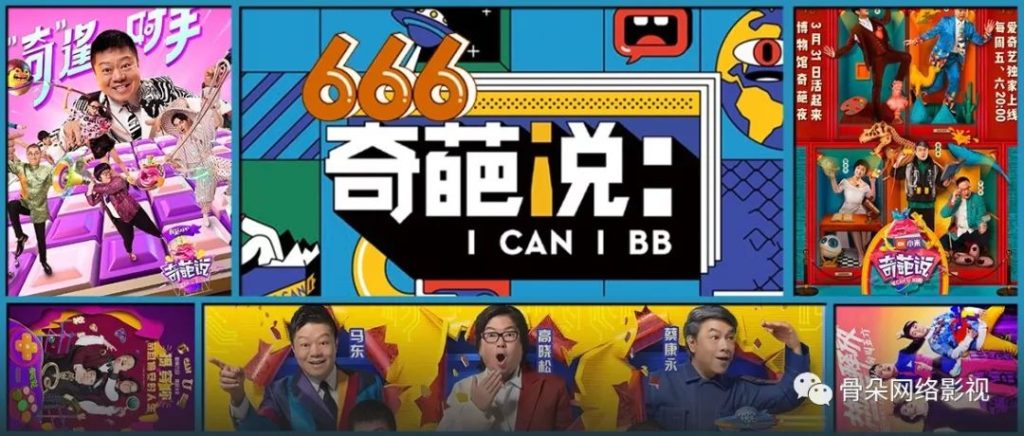
Poster of Qi Pa Shuo.
Not everything on Qi Pa Shuo is to our tastes, but personally we have always cherished the existence of such a show in today’s China. In a time that free thinking is no longer encouraged in public entertainment, Qi Pa Shuo and its featured guests, the group of “odd souls”, has done a tremendous job in opening up the public’s mind through critical debates. For that we think the production team deserves a thumbs-up.
Then it flipped. In the public’s mind, Qi Pa Shuo turned from a praise-worthy production to a trashy, evil, capitalistic (yes, “capitalistic” now has a negative connotation in the Chinese Internet’s language environment) scheme that is filled with “traitors”, all because of what Qiu said.
So what did she say?
From 2012 to 2014, during Qiu’s career as a reporter for a Hong Kong newspaper, she was relatively active on Facebook. When the Yellow Umbrella Movement broke, she spoke out a few times in support of the protestors and questioning the CCP’s policies regarding issues such as reforming Hong Kong primary schools’ textbooks. She was certainly vocal, and perhaps she sometimes even let her ego did the thinking; the many comments and conversations she posted on her own Facebook page was never deleted, and now, six years later, they all became evidence of crimes in the mind of Chinese netizens.
Since March 15th, Weibo has been dominated by posts railing against Qiu Chen. Fierce Little Pinkies, or more accurately, the Internet Red Guards, dug up every word, photo, and video on her social media profile, and used them as sources for endless Big Character Posters (大字报). “Hong Kong Independence Supporter” (港独分子), Sovereignty divider, foreigner’s minion, traitor, liar…, sinful titles for Qiu flooded the Chinese internet. With the most horrible words spewed, Qiu was trashed, piece by piece, straight onto the floor, as the lowest, most disgusting kind of human being in the Red Guards’ eyes: the kind that supports national division, the kind that is brainwashed by Western values, the kind that profits from mainland Chinese people while betraying her own country.
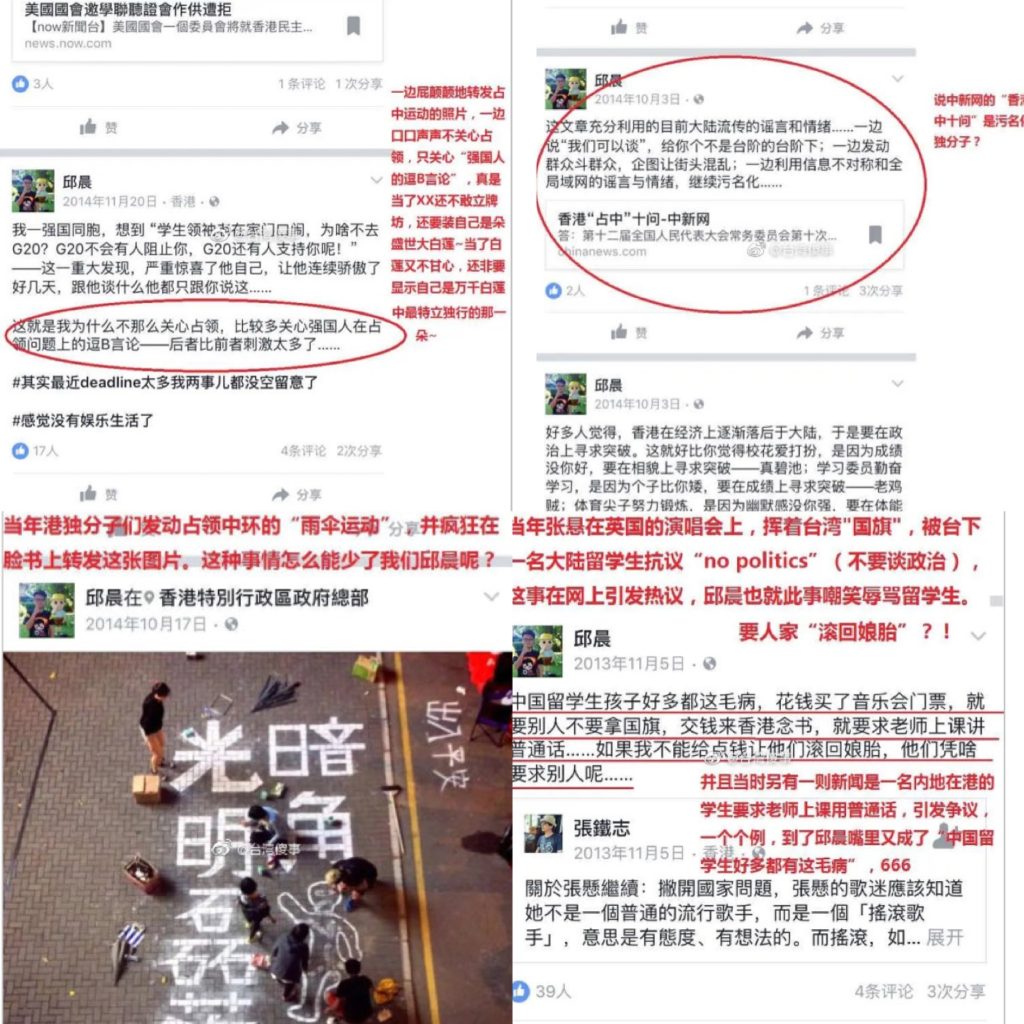
Some of the "evidences"of Qiu Chen's speech crime gathered by netizens.
On March 16th, the national newspaper People’s Daily posted a commentary titled “Chicanery Doesn’t Work on Matters of National Justice” (国家大义容不得巧舌如簧) to directly condemn Qiu. The same evening, Qiu wrote on Weibo to apologize and stated that she will permanently withdraw from all public activities. Since then, Qiu, the once hugely adored public figure, a popular debater and a social advocator, completely disappeared. As we checked today, her own Weibo page is no longer accessible due to “public report of illegal conducts”.
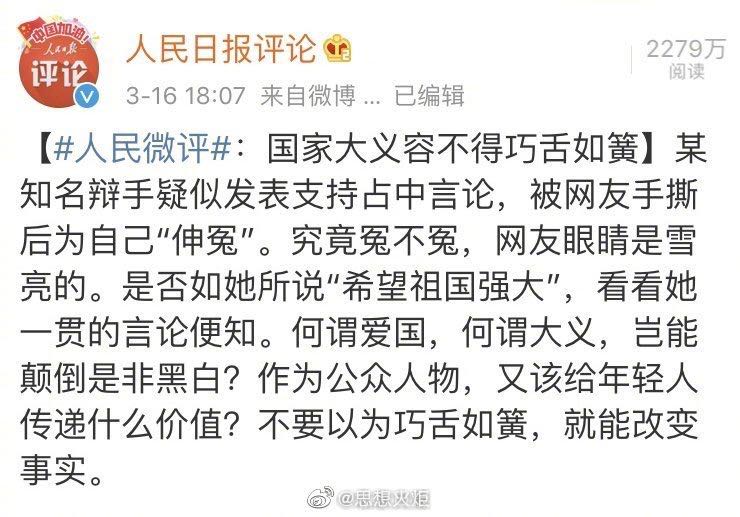
People's Daily official commentary to convict Qiu.
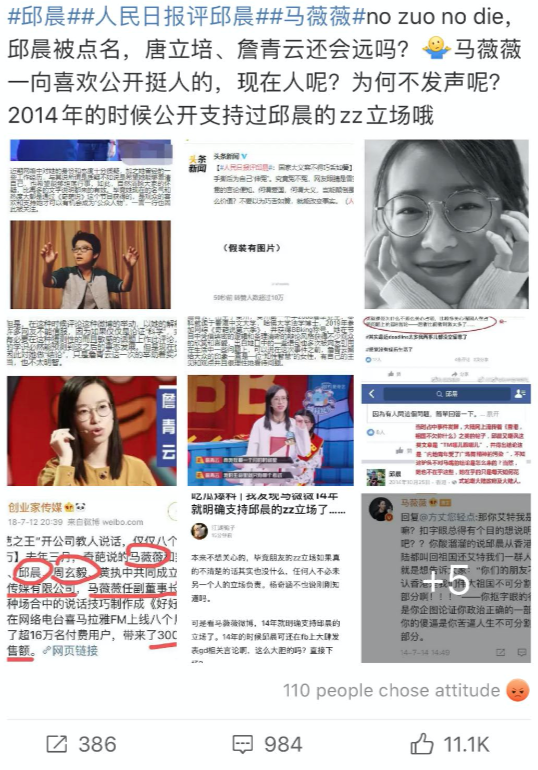
After Qiu's incident, people began to "dig the grave" (挖坟, collecting a person's social media information) of other famous contestants on Qi Pa Shuo, questioning their loyalty to the country.
Qiu vanished like a snowflake in the summer from the public view, but in the eyes of Chinese netizens, her sins are tattooed deeply on her skins, flowing with the blood in her vessels. She doesn’t deserve forgiveness they say; she shall be punished to death, her crimes should be tied around her neck and sink her to hell.
She might never be able to come back.
-
The Writer who “Betrayed her Country” (卖国贼)
On January 25, just two days after Wuhan’s lockdown, Chinese award-wining writer Fang Fang began to publish an online diary to chronicle the everyday quarantine life in her home city. Simply titled “Diary under Lockdown”, Fang Fang’s series became a vital reading for tens of millions of Chinese readers during the most difficult time of the pandemic. The diary kept going for two months, eventually ending on March 25th.
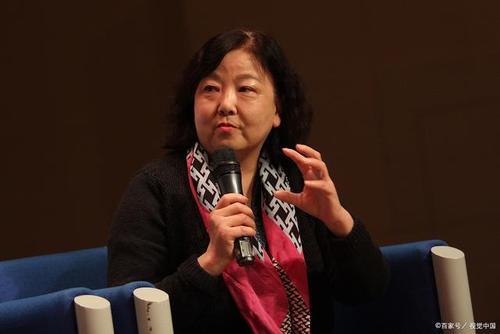
Writer Fang Fang.
To be frank, we haven’t read through every single post of Fang Fang’s diary. Amid all the tragic stories happening at the epicenter, Fang’s personal recording seemed plain-spoken and ordinary, sometimes caught up too deeply in the trivial aspects of life. But her writing’s honest and spontaneous nature is certainly beyond valuable; her words provide a window into the suffering in Wuhan for the outsiders, and keep an important, raw record of the humanity and complexity of the 2-month lockdown from a local witness’s perspective.
By the beginning of March, public opinion on Fang Fang’s diary gradually shifted as COVID-19 escalated into a global crisis and the relationship between China and the world worsened. Chinese media’s one-sided report of situations around the world, such as that westerners did not wear protective masks and were hoarding groceries in panic became the kind of stories that stimulated domestic patriotism and pride. When the general atmosphere online was to call other countries to “copy China’s homework (抄作业, to learn from China)”, Fang Fang’s relentless voice on demanding the truth and accountability for the initial breakout becomes jarring. More and more netizens accused Fang of being ungrateful to the Chinese government’s effort, that her writing only reflects the misery of the people of Wuhan yet lacks the affirmation of the collaborative achievement of the nation, which is evidently the greatest nation in the world at this stage as her accusers believe.
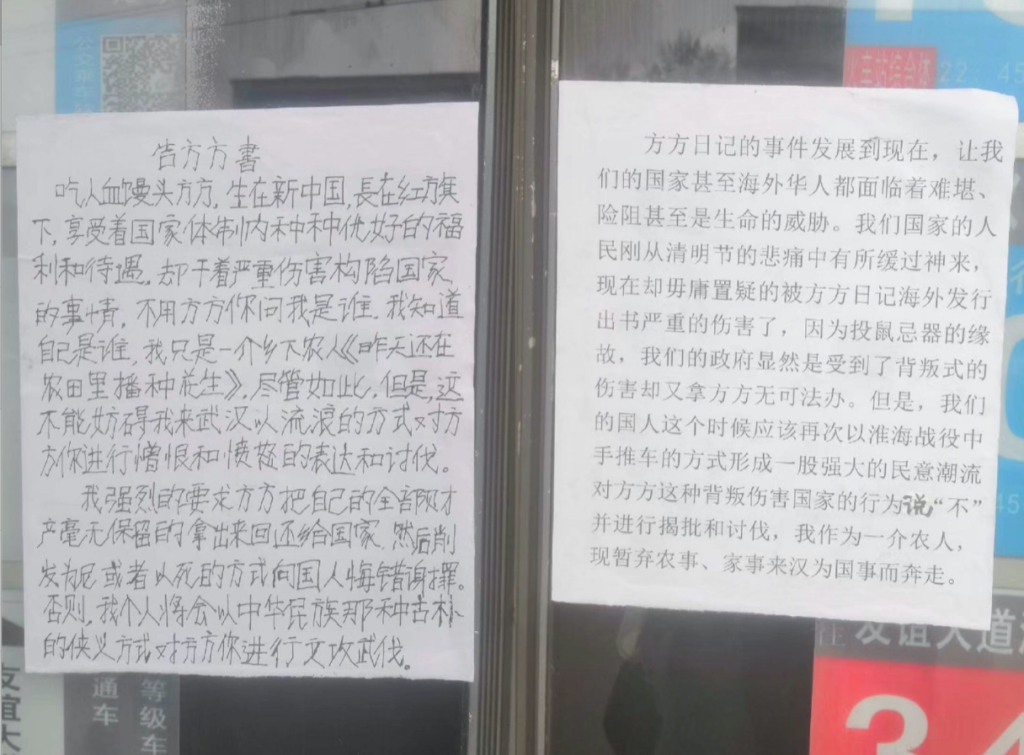
Posters in crusade against Fang Fang.
In early April, just a few days after Fang Fang published the last entry of her diary, some people discovered a preorder link for the English version of her diary on Amazon. According to public information, the book, titled Wuhan Diary: Dispatches from the epicenter (the title has now been changed to ‘Dispatches from a Quarantined City’ due to public pressure), was to be released in late June by Harper Collins in both English and German. The news soon drew bitter condemnation from zealous nationalist netizens who started to accuse her as a disgraceful traitor. In their eyes, the overseas publication is a calculated effort to undermine the image of Wuhan and, more importantly, to malign the Chinese government’s heroic effort in managing the pandemic.
Netizens questioned how the English publication process could be done so quickly, some even constructed conspiracy theory that the diary was a pre-paid request by foreign publisher in the first place as part of the scheme to overthrow the Chinese government. In the public’s view, Fang Fang, holding a position in the National Writers Association hence a member of the system (体制内), is “handing a knife to those foreign media who wish to stigmatize us.”
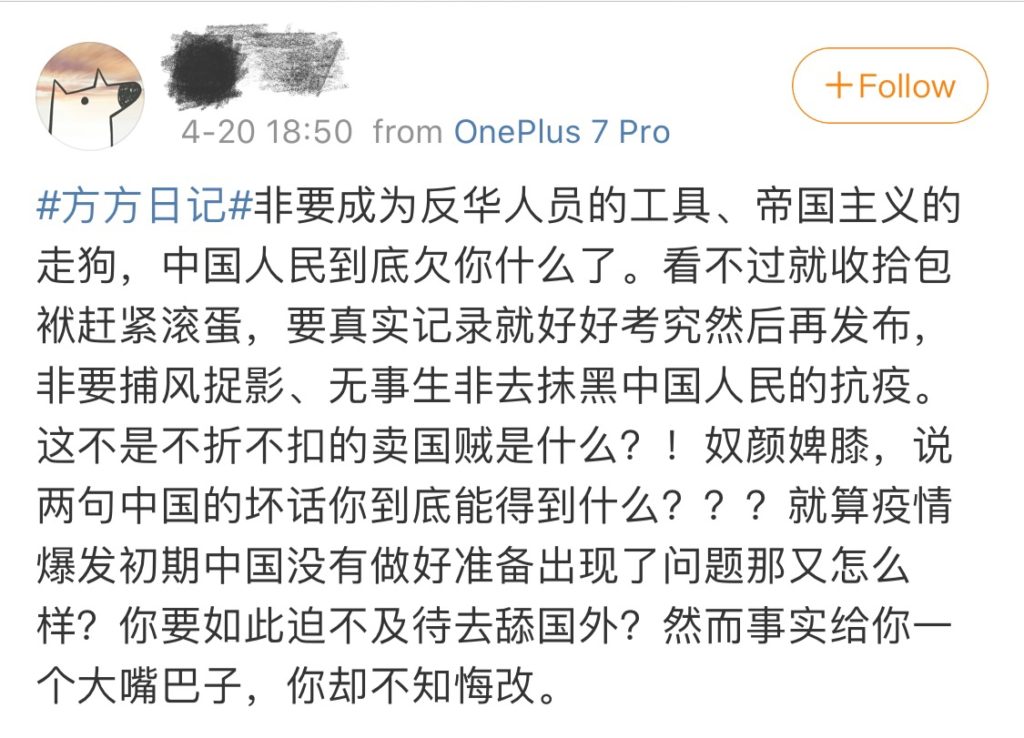
A typical comment of Fang, calling her a traitor and, well, many other ugly words of the same meaning.
To publish a book in China is a painfully complicated process. Not only do you need to collaborate with a state-owned publisher in order to be qualified to apply for an ISBN (which is issued with limited number every year), you also must go through the excruciating journey of censorship. Every single word of the work, from title to the flyleaf would be scrutinized. To successfully publish a book in China would normally take 6 months at least. Having worked with the publishing industry ourselves, we could somewhat relate to Fang’s decision; if there is an option to keep the original words that truly reflect your feelings and observations, wouldn’t you choose to?
But our views were in the minority. Many Chinese authors who have personally dealt with publishing restrictions in China criticized Fang for publishing her work in English first, “it is simply indecent.” In their collectivistic state of mind, when China is facing intense accusations from the whole world for causing the pandemic, the Chinese must unite together under one voice that’s filled with confidence and self-pride. Fang Fang as a local citizen of Wuhan might has the right to demand accountability from the authority, but she should never let these questioning be heard by foreigners. Like the Old Chinese saying, “Ugly affairs shall be kept only within the family(家丑不可外扬)”.
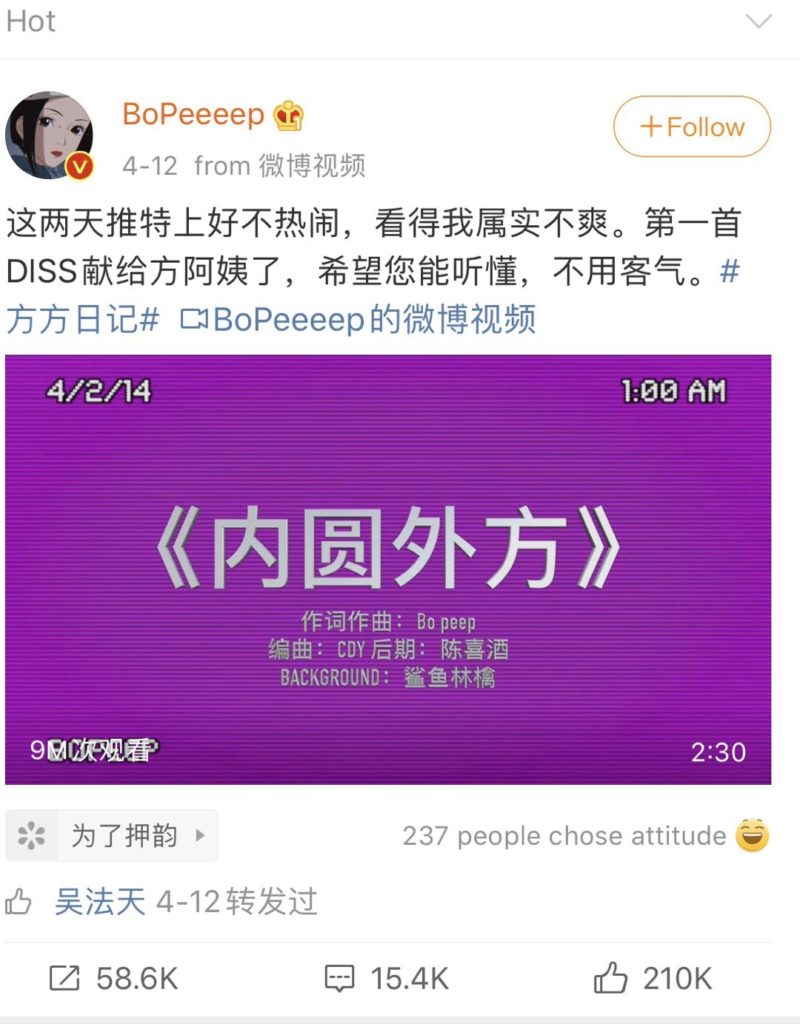
A young rapper's diss track against Fang went trending on Weibo for days.
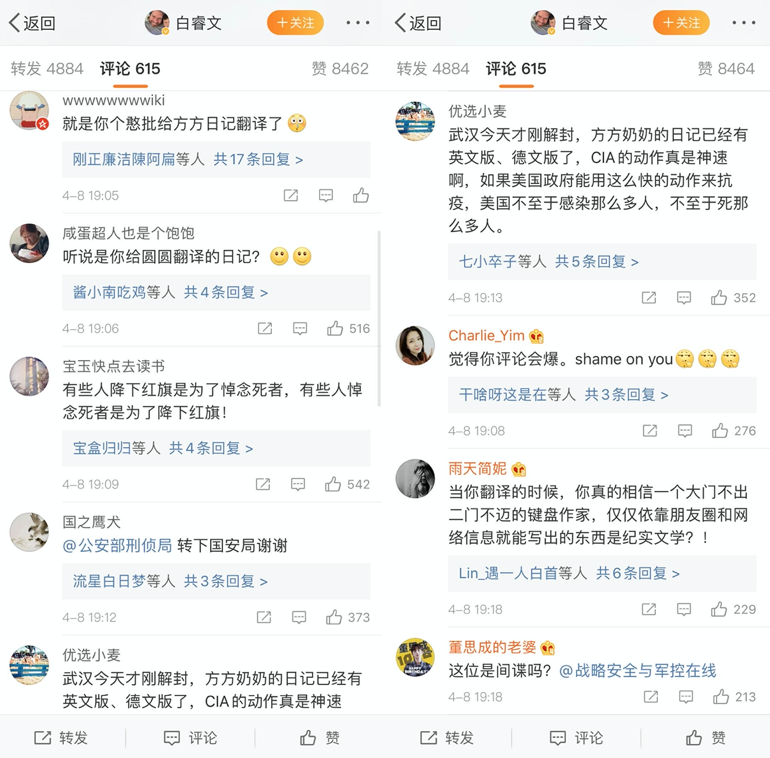
The translator of the diary, a reputable academic of Chinese literature Michael Berry was also being attacked by furious patriots.
As for today, Fang Fang had openly discussed this issue several times both on her Weibo and in interviews, explaining that she meant no malignity and is going to donate all of her copyright royalty to charities. Unfortunately, there’s no sign of netizens’ verbal abuses to end just yet. “Grandma Fang is already a member in the hall of shame, we the Chinese must never forgive her”, they say.
-
The Online Influencer Who “Licked Foreigner’s Ass” (慕洋)
On March 12th, lifestyle vlogger Zhuzi (Weibo ID: 你好_竹子) wrote an emotional diary on Weibo recording her interaction with her in-laws in the UK and expressing her sympathy towards the pandemic’s situation in Europe. “Witnessing everything happening in Europe personally,” She wrote, “I can’t help but to say sorry from my heart for countless times.” The post received a massive rebuke by netizens, criticizing Zhuzi’s apologetic attitude toward foreigners, and for the fact that she did not correct her British nephew-in-law who believed the virus originated from China.

Vlogger Zhuzi.
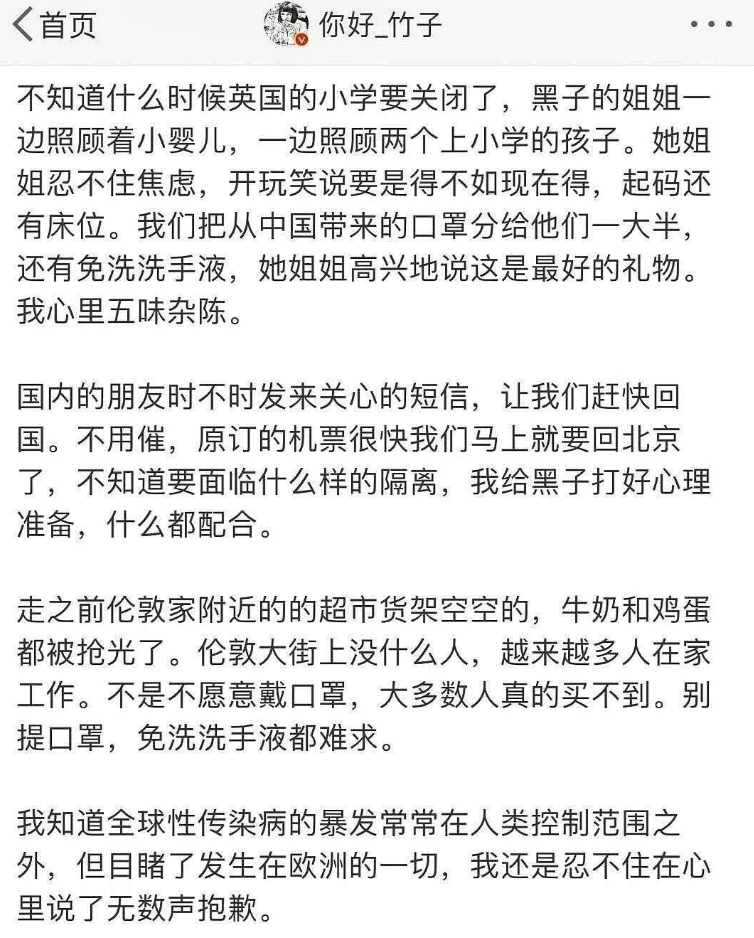
Zhuzi's now-deleted post documenting her visit to her husband's family in London.
In the post’s comment section, Zhuzi replied to a netizen who argued that the virus did not originate from China by suggesting: “shall we talk about this where there is evidence?” Such expression quickly inflamed further condemnation as people began to use nasty words for personal attacks, calling her a “foreigner’s ass-licker” and a “Westerner’s watchdog”. A few hours later, Zhuzi quietly deleted her original post and disappeared from social media for a month.
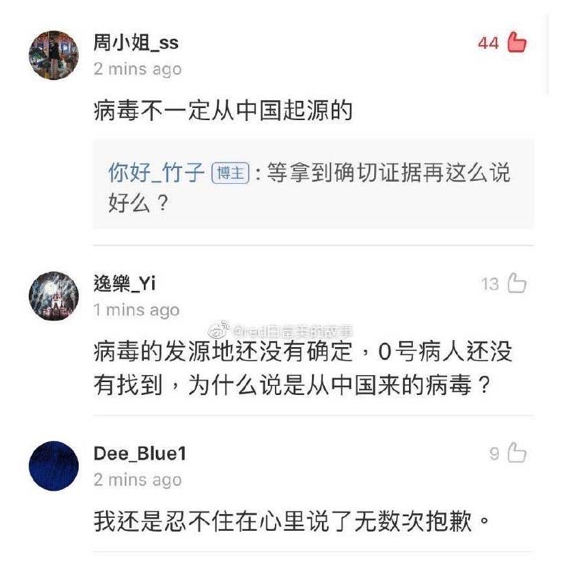
Before this incident, Zhuzi was one of the most popular vloggers on Chinese social media with 4 million fans, famously known for her international background and cheerful personality. Last year, she married her British husband and moved back to Beijing from London. The couple stayed in China during the height of the pandemic and made the decision to fly back to London when her husband’s sister gave birth. As a digital influencer, Zhuzi shared all of these details of her personal lives with her fans, and no one was criticizing her until she spoke about the sensitive, untouchable topic: the origin of COIVD-19.
We all know more or less about this ridiculous, childish buck-passing between China and the U.S now: as early as January, the conspiracy theory that U.S Military Games delegates intentionally spread COVID-19 in Wuhan was already lurking on Chinese social media. In mid-March, Zhao Lijian, the now world-famous spokesman of the Chinese Ministry of Foreign Affairs tweeted a link alleging the US was responsible for the virus. Then there was President Trump’s “Chinese Virus” counterattack, then more war of words from Beijing, followed by more blame game from Washington…all while the world’s population struggled to contain a pandemic so disruptive and tragic to human lives.
While China’s Foreign Affair folks were busy firing attacks on Twitter, domestically, national media has been working hard to construct a public narrative to shift China’s responsibility in the global outbreak. The issue of the virus’s origin – a serious matter that should be determined by strict scientific research – has now turned into an aggressive propaganda campaign for nationalistic sentiments. Today, there is no longer space left for rational, science-based discussions; to argue that the virus did originate from China on Chinese social media is almost a verbal treason, a crime that Zhuzi unfortunately committed despite her simple personal intention at the first place.
Two days ago, we discovered that Zhuzi finally spoke on social media again with an apology letter: “I shouldn’t have deduced the origin of the virus under the circumstance where I lack the relevant knowledge, and I am willing to accept criticisms after a long time of profound self-reflection…but I wouldn’t accept the accusation of me as being unpatriotic; having lived overseas for years, I’ve always been a proud Chinese who love my country and my culture.”
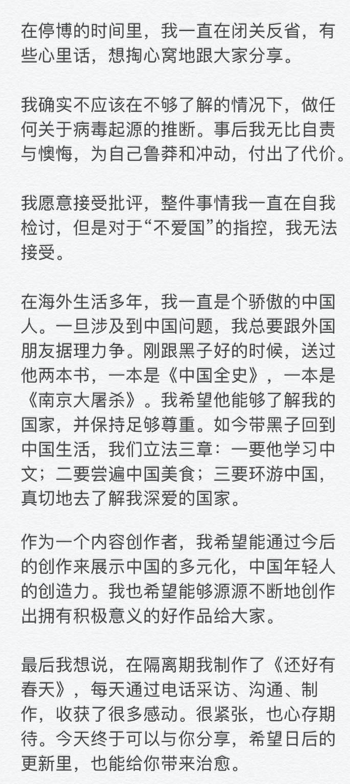
Zhuzi's comeback note after a month of silence.
Under the post, her loyal followers welcomed her back and accepted her apology (as if she had truly made a mistake), but netizens’ angry assaults continued to spread on other social media platforms. In a Douban thread discussing Zhuzi’s comeback, some of the most-liked comments wrote: “I’m not going to forgive her. She’s just saying that for the sake of making money.” “Get out of China, you foreigners’ ass-licking bitch.”
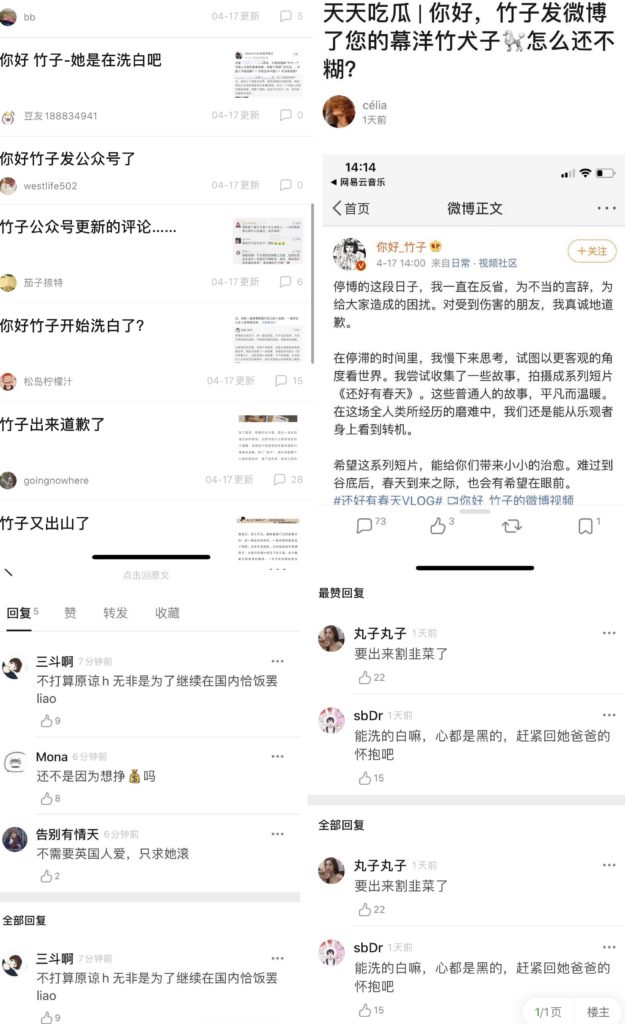
Verbal attack on Zhuzi continues until this day.
In China’s 5000-year history, there were once a lot of ancient philosophical thoughts that we believe set the high moral standards of our nation. “Listen to both sides you will be enlightened, heed only one side you will be benighted.” (兼听则明,偏信则暗). “Treat others the way you like to be treated” (己所不欲,勿施于人) and many more. Sadly, during this global pandemic, a defensive, intolerant tone now marks most of the domestic public discussion. Today, everything is wrong except patriotism, and everyone could be wrong as long as they have an “incorrect” opinion.
There’s now only one right and one wrong; the wrong will never be right, and the right could never be wrong.
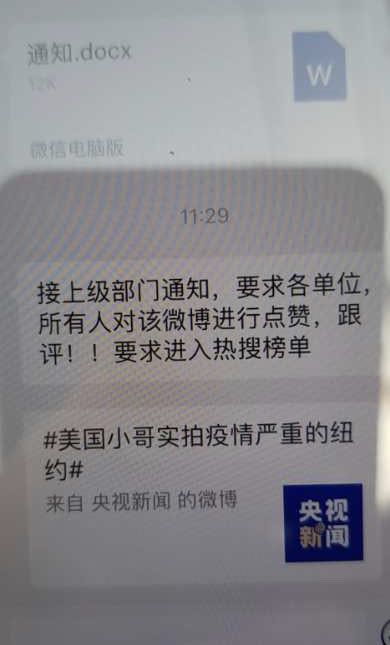
A screenshot showing someone being ordered by "upper-level government agency" to like and comment a piece of news about "the pandemics' severe situation in New York".
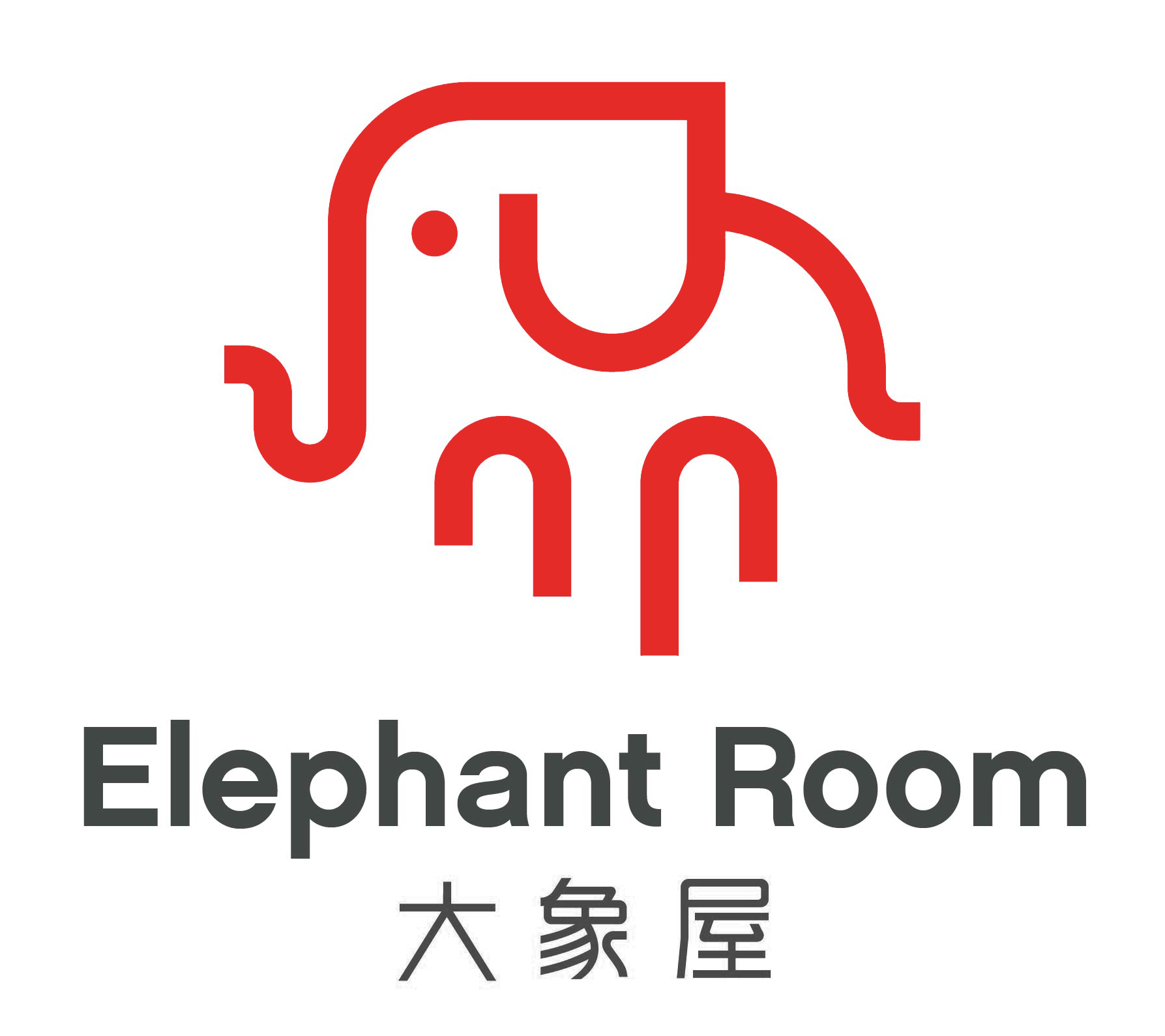
Very good piece, thank you.
Thanks very much for sharing this information – unfortunately this kind of useless, negative, and (I believe) sinister behavior is promoted by authoritarians everywhere, including here in my own country (the USA). You are brave and, despite the content of this entry, because of people like you I remain optimistic about things in the long run.
this is amazing and I am so grateful to hear from my sisters on the other side of the world. We are the solution. Please keep writing. Keep strong and brave. You cannot begin to imagine how important it is to hear from you here in New York. We are all the same. You are a testament to that. I know its hard and you will get tired. I am tired here too in New York with Trump and with this virus and the end of life as I knew it. But it must be for some reason. We must… Read more »
Thank you, you say very important things that should be read more widely. I wish for your continued safety. China does not have a 5000 year history though, there’s only evidence going back 3500 years approx. It’s a shame to further spread this incorrect this propogandist boast.
great piece – thanks for writing.
Great piece. Thanks for writing. I would question whether the fate of 你好竹子 is quite as serious as that of 邱晨. Without wanting to sound uncharitable, the former is a privileged influencer who trades on her glamour and enviable lifestyle without any apparent cause or ideological position – one would expect her to bend to the prevailing political wind whatever its direction. The latter has a lot more to lose, has made much more powerful enemies and is a much more sinister bellwether.
Thank you, really appreciate your effort to bring light to Chinese society–it is not all dark, and at the opposite end, it is not all “Lei Feng”雷锋.
Interesting how you describe the Chinese netiziens as “collectivist” masses, essentially de-individualizing them as a mob, while making broad-stroke criticisms against them. The hypocrisy and self-righteousness displayed in this piece is precisely why many Chinese civilians have grown less sympathetic to outside criticisms, however legitimate they may be. I can understand their sentiment somewhat: damned if you do, damned if you don’t, so why bother? That being said, I have yet seen Westernized Asians criticizing any Western nation they live in to the level of degree that they criticize China without being painted as a “50-cent wumao” or “CCP-shill”, or… Read more »
Zhao lijian said the virus may come from America because Pompeo and some American politican said “Chinese Virus” first. It is just a strike back.
Very interesting piece! Thank you so much for sharing. These are the hard times for everyone. And I am very afraid of what might come, as so much hate spreads from many people. I guess that such behavior is very typical though. I live in a country in Europe that five years ago faced really big (military) conflict with its neighbor. It killed all constructive thoughts and opinions around. I don’t know how much of that was inspired by the government, but people themselves went to the imaginary war and started to “protect their country” from the “traitors”. “Your country… Read more »
“Today, to destroy a person’s reputation no longer requires the door-knock from the authority” I do like this line! LOL
Chinese are very defensive after western attempts to carve up their nation in the 19th century with gunboat diplomacy that appears to being repeated again. Like the Israelis who are deeply sensitive and aggressive toward anti-Semitic sentiment, Chinese are also vowing “Never again!“。